‘Not credible’: Big 5 US banks lack disaster-readiness, violate Dodd-Frank Act, regulators say

Wary of a repeat of taxpayer bailouts for “too big to fail” banks, the Federal Reserve and Federal Deposit Insurance Corporation issued a first-time joint statement criticizing five top banks’ strategies for avoiding bankruptcy as “not credible.”
The five banks, JPMorgan Chase & Co., Bank of America Corp., Wells Fargo & Co., Bank of New York Mellon Corp. and State Street Corp., with a total of about $5.6 trillion in assets, were among eight bank whose plans were evaluated.
“The agencies have jointly determined that each of the 2015 resolutions plans of… [the five banks] was not credible or would not facilitate an orderly resolutions under the US Bankruptcy Code, the statutory standard established in the Dodd-Frank Wall Street Reform and Consumer Protection Act,” said the Federal Reserve and the FDIC in a press release on Wednesday.
Who's more unprepared; Fed's or Banks? US banks not prepared for another financial crisis, say federal regulators https://t.co/RY3QIuQVA4
— Jim Nussle (@Nussle) April 13, 2016
Under the Dodd-Frank Act, a bank with total consolidated assets of $50 billion must have a plan, or a “living will,” in the event of bankruptcy. Nearly a decade after the financial crisis, and a slow recovery for the economy, Washington is keen to avoid a repeat of the bank bailouts.
“The FDIC and Federal Reserve are committed to carrying out the stator mandate that systematically important financial institutions demonstrate a clear path to orderly failure under bankruptcy at no cost to taxpayers,” FDIC Chairman Martin Gruenberg said in a statement, according to Reuters. “Today’s action is a significant step toward achieving that goal.”
#BankofNewYorkMellon and State Street Bank were cited by the #FederalReserve and the Fed Reserve and the Fed https://t.co/nNbyFBN5WE
— rasi (@twisira) April 14, 2016
The agency’s vice chairman, Thomas Hoenig, told Reuters, however, the plans showed that no firm is “capable of being resolved in an orderly fashion through bankruptcy.”
“The goal to end ‘too big to fail’ and protect the American taxpayer by ending bailouts remains just that: only a goal,” he said.
House passes bill to weaken Dodd-Frank and help Wall Street, Kochs brothers http://t.co/QaEBfRVIwx
— RT America (@RT_America) June 26, 2014
Reuters reported the banks failed in 2008 for reasons “ranging from the way liquidity would be housed and shuffled among domestic and foreign subsidiaries to the manner in which executives would communicate problems as they arose during a crisis.”
Banks have until October 1 to resolve the weaknesses of their plans and if they fail to meet the deadline, they are “subject to more stringent prudential requirements.”
Those requirements could be leverage, stringent capital or liquidity requirements, as well as restrictions on growth, activities or operations of the firm or its subsidiaries. If deficiencies persist for two years, then the banks will have to divest their assets. Today’s announcement is the start of a regulatory chain that could end with breaking up the banks.
#BoomBust: Big Banks ‘Living Wills’ fail as ‘Helicopter Ben’ returns [VIDEO] https://t.co/IzUXu9fD57@AmeeraDavid@edwardnh@BiancaFacchinei
— RT America (@RT_America) April 13, 2016
Weaknesses were also identified by regulators in resolution plans for Goldman Sachs and Morgan Stanley, but the Fed and FDIC did agree on the deficiencies. The FDIC said the plan submitted by Goldman Sachs was “not credible” and “would not facilitate an orderly resolution” for bankruptcy. The Fed said Morgan Stanley’s plan was “not credible.”
"We're going to do everything possible to fix this issue," said Jamie Dimon, CEO of JPMorgan, on a call with analysts Wednesday. "We have tons of liquidity. It's more about reporting legal entities."
Wells Fargo said it has made strides to get up to code, and it will meet the October 1 deadline.
"We were disappointed to learn that our 2015 resolution plan submission was determined to have deficiencies in certain areas," a spokesman for Wells Fargo told CNN Money. "We understand the importance of these findings and we will address them."
Citigroup’s resolution plan received the least criticism from regulators.
Regulators are also continuing to asses the plans of four foreign banking organizations – Barclays PLC, Credit Suisse Group, Deutsche Bank AG and UBS.













